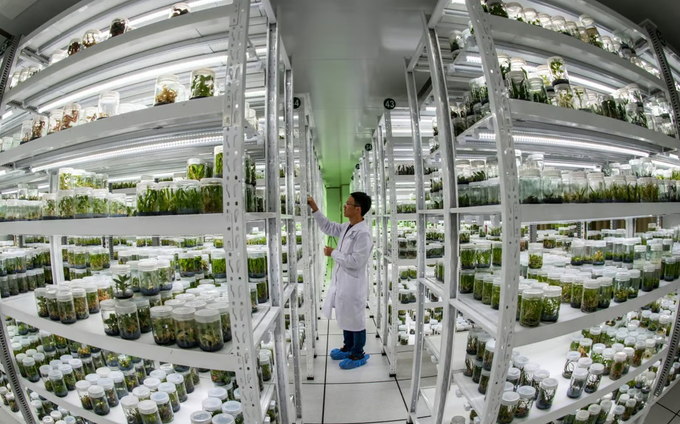May 31, 2025 | 18:56 GMT +7
May 31, 2025 | 18:56 GMT +7
Hotline: 0913.378.918
May 31, 2025 | 18:56 GMT +7
Hotline: 0913.378.918

China faces increasing pressure to feed its 1.4 billion people and mounting external uncertainty, says Xi Jinping. Photo: Xinhua
China’s seed industry lacks competitiveness in major vegetables such as corn and “seriously relies on imports” for most non-staple food, a group of officials from central China said in a recently published article.
“High-end vegetable seeds from overseas are sold by number, but home-grown vegetable seeds are sold by weight. The gap in their market value is huge,” officials from Hubei province’s seed administration wrote.
Dubbed the “chips of agriculture”, seeds bred in China are generally deemed of low quality and low efficiency, while the industry suffers from a lack of innovation and is losing its edge in the global market, said the article published last week in the country’s top agricultural journal, China Seed Industry.
China has vowed to boost support for seed breeding technologies to ensure food security amid worsening ties with the US – where most of its food and seed imports come from – and prepare for the increasing impact of climate change, urbanisation and shifting diets.
“The 1.4 billion people in our country were well fed in the past couple of years and we’ve held our bowls steadily in our own hands. Now, the demand for food is increasing, so is the pressure of holding the bowl,” President Xi Jinping said in the annual national rural work conference in December.
The country saw a deficit of 350 million yuan (US$50.9 million) in crop seed trade in 2021, mainly driven by the demand for vegetables, according to figures from the Ministry of Agriculture and Rural Affairs.
Considering seed technology and preserving farmland are the two top priorities for China’s food production, the central government issued a seed industry revitalisation plan in 2021 in the aim of having control of seed sources.
Despite the fact foreign breeders occupy just 3 per cent of China’s seed market, domestically produced seeds of corn and soybean are “more than 20 years behind” the United States in terms of yields, the Hubei officials said.
Yields of both crops are only about 60 per cent of those growing in the US, they said.
While a strong industry requires long-term commitment, many domestic seed companies are short-sighted and share a mentality of “being satisfied with small wealth”, they said.
In a move to consolidate the sector, the agriculture ministry last year picked 276 domestic breeders that would receive special government support in capital and talent.
At a meeting with representatives from these state-supported companies over the weekend, it said their innovation and competitiveness have been strengthened through increased investment and enhanced cooperation with research institutes and financial companies.
But Huo Xuexi, a professor of agricultural economics from Northwest A&F University, said China would need decades of time to get where the West is now in seed breeding.
“Revitalising the seed industry is a tall order,” he said, referring to China’s ambition to achieve self-reliance.
“First of all, we need at least 10 years to figure out basic scientific questions in agriculture, and then it will take another long period to bring basic research results to the market.”
(SCMP)

(VAN) Vikas Rambal has quietly built a $5 billion business empire in manufacturing, property and solar, and catapulted onto the Rich List.

(VAN) Available cropland now at less than five percent, according to latest geospatial assessment from FAO and UNOSAT.

(VAN) Alt Carbon has raised $12 million in a seed round as it plans to scale its carbon dioxide removal work in the South Asian nation.

(VAN) Attempts to bring down the price of the Japanese staple have had little effect amid a cost-of-living crisis.

(VAN) Fourth most important food crop in peril as Latin America and Caribbean suffer from slow-onset climate disaster.

(VAN) Shifting market dynamics and the noise around new legislation has propelled Trouw Nutrition’s research around early life nutrition in poultry. Today, it continues to be a key area of research.

(VAN) India is concerned about its food security and the livelihoods of its farmers if more US food imports are allowed.